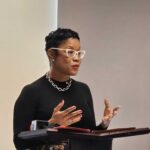Primary schools began a new timetable this week featuring daily reading blocks, but a literacy specialist cautioned that a targeted, subject-based approach is urgently needed to tackle persistent challenges with comprehension and literacy across the curriculum.
The new daily reading session is part of the Ministry of Educational Transformation’s Project SOAR (Strengthen Our Ability to Read), part of a range of newly announced reforms. It aims to ensure all seven-year-olds can read.
Shawntelle Morgan, founder of I-Teach Transformative Knowledge Solutions Ltd, said the initiative is “a step in the right direction” but urged that a focused effort in employing content area reading should also be introduced at the primary level, especially for students with existing reading difficulties.
Content area reading is the practice of developing comprehension and literacy skills to engage with specialised texts across academic subjects such as science, mathematics, and social studies, rather than focusing solely on English literature.
“At the secondary level, this is what would be referred to as content area reading… where learners would be introduced to the unique vocabulary of that particular subject area,” Morgan explained in an interview with Barbados TODAY. “So they’re now not just learning to blend and segment and learn words, but they’re understanding that words may have different meanings depending on the subject area that they’re studying.”
Recalling an earlier teaching session, Morgan remarked, “I had a session this morning and I asked one of the learners if they had ever heard the term stigma. I remember quite a few of them raised their hands, and they said, ‘yes’, they’d heard the term stigma – we’re talking about stigma in regards to dyslexia – when I asked the child, ‘Can you tell me what you know about stigma?’ She said it was a part of the plant. Yes, she was correct that a stigma is a part of the plant, but in the context of which we were looking at stigma, it was not a part of a plant.”
She stressed that helping children grasp the nuances of language across subjects is crucial, and said it would go a long way in improving literacy outcomes, beyond a stand-alone reading block.
“So we want children to understand that words can have different meanings within different contexts,” Morgan said. “That they can appreciate that if you’re writing an essay in history, you’re going to focus more on chronological order than you would if you’re writing a story in English that may have characters, plots, scenes, and things of that nature.”
Building this foundation early will ease the transition to secondary school, where reading demands become more complex, she argued.
She said: “We want to focus on this so that when learners make a transition to the secondary level, they already have an understanding that reading goes beyond letter sounds, making sentences, and paragraph development. Yes, that is part of reading, but it goes beyond that.”
Morgan noted that reading is often narrowly associated with language arts at primary school and English literature at secondary level: “Whenever we think of reading, what comes to mind in primary school, grammar, language arts. We don’t think of reading in terms of maths or even other subjects, and then at the secondary level, when we think of reading, we think English language and English literature. We don’t really consider subjects like science and maths and those types of subjects.”
While she applauded the reading block as a bold step, Morgan cautioned that careful groundwork will be required to make it effective. “I’m excited about the reading block, but I do think that we need to look at the groundwork for implementing it. Giving the teachers enough time to actually plan and prepare so that it’s effective, and also looking to merge reading across the curriculum, even from the primary level.”
She added: “I felt like things like building fluency and stamina might benefit from children having consistent practice in terms of comprehension and uninterrupted reading blocks to nurture these habits… but what really concerned me is that one size does not fit all…. Some may be struggling with decoding, and then others may be reading above grade level. So without differentiation, a blanket reading block may actually frustrate weaker readers.”
(SB)
The post Schools urged to broaden reading focus appeared first on Barbados Today.


